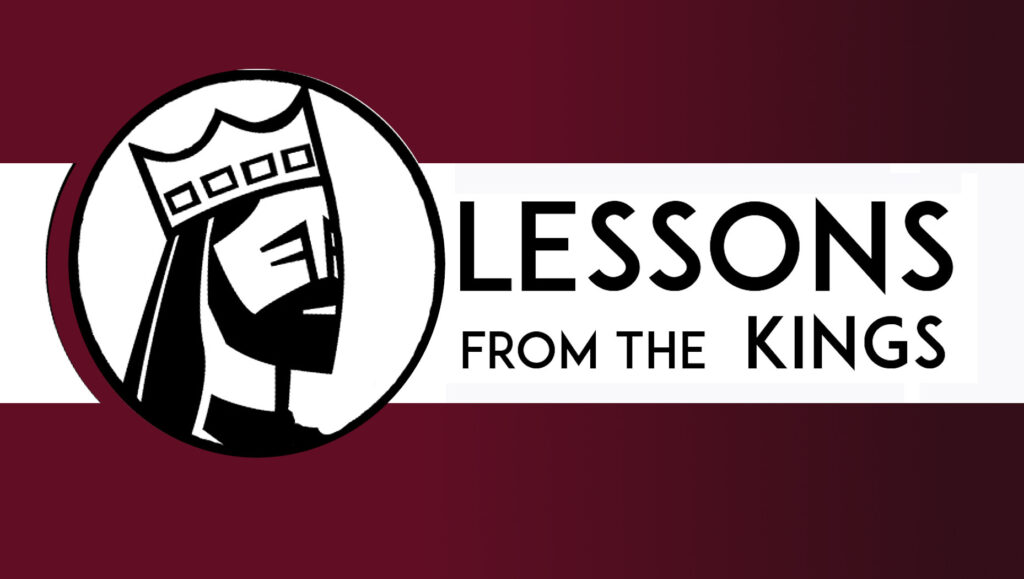Recorded live and shared here at 9am MST February 4, 2021. [This different video format was an experiment. Unfortunately, you cannot hear the audio of the participants. We will switch back to the old format next week.]
Our Adult Discipleship group (a midweek Bible class) is going through the Kings of Israel and Judah. You are welcome to join us for any session in person or online. See the calendar for dates. [View Series & Handouts]
This chart is a map of our course of study. We will go chronologically king by king.
The Destructive Power of Pride
When God healed Hezekiah, he had given him a sign that he would live which involved the shadow of the sun going backwards ten steps on his stairway. Word of his healing, the miraculous sign, and no doubt the defeat of Sennacherib’s army reached the Babylonians (2 Chronicles 32:31). Read Isaiah 39.
What should have been the first thing Hezekiah shared with the envoy from Babylon? Why do you suppose he wanted to show off his great wealth?
What is the first thing that you like to show people when they come to your house? What are some ways that you can reflect thanks to God and glorify him when people are interested in learning more?
Even the best of the kings of Jerusalem had faults that are recorded for us. What does that impress on us?
No other King has more recorded on their life in Scripture than Jesus. Why is it so important that Scripture emphasizes his faultless character for us?
King Manasseh
Manasseh’s reign was marked with relentless wickedness. He worked hard to undo all the reforms of his father Hezekiah. He traveled throughout the land to firmly establish idol worship. He was ruthless and murdered countless innocent lives so that he “shed so much innocent blood that he filled Jerusalem from end to end.”(2 Ki 21:16) He sacrificed his children in the fire to the god Molech. He built altars for false gods in the temple of the Lord. In addition to pagan worship with Baal and Ashtoreth he instituted worship of the stars and planets.
The Lord was patient with such great sin, but the king and people were obstinate. “Manasseh seduced Judah and the inhabitants of Jerusalem to do more evil than the nations whom the Lord had destroyed before the people of Israel. The Lord spoke to Manasseh and to his people, but they paid no attention.” (2 Chr 33:9-10)
When the Lord humbled Manasseh and made him a prisoner of the King of Assyria, he repented. He was returned to the throne. Then he enacted sweeping reforms with earnest faith. His own soul was saved, but his reforms came too late to undo the damage already done to his kingdom. Despite his miraculous conversion and repentance, Manasseh is labeled the evilest of all kings and is credited with the cause for Judah’s downfall. (2 Kings 23:26-27, 2 Kings 24:3-4, Jeremiah 15:4)
Read about Manasseh: 2 Kings 21:1-17; 2 Chronicles 33:1-20
How Great is God’s Patience!
Discuss what is often considered and implemented as the best strategy for doing mission work. Should we send missionaries only to places which are receptive to our preaching or should we target places where there is great rejection of the Lord? Which is easier? Which does God will we work toward? Read 2 Chronicles 33:1-10
Manasseh had a godly father, had many prophets sent to him, and had a long reign (55 years). Despite all this his wickedness even exceeded that of the godless nations that came before Israel. What does that fact impress on us?
God kept sending prophets to Manasseh and the people, but they kept not paying any attention. God is patient. He also wants us to be careful not to let those who despise him despise his gifts. “Do not give dogs what is holy, and do not throw your pearls to pigs. If you do, they will trample them under their feet and turn and tear you to pieces.” (Mt 7:6) Discuss: How do you determine if it is worthwhile or wise to try to reach someone who is persistent in evil?
Consider how much of God’s working in your life is a result of his wonderful patience and grace for sinners. In unbelief we cannot respond, but in faith we respond to his grace. Identify two or more appropriate responses to his rich patience and grace for you.
How Great is God’s Mercy!
Name some people from Scripture who come to mind when you think of grand displays of conversion and repentance. What do you find more amazing: God’s mercy and patience or their blindness to their own sins up until they repented? One of the Bible’s greatest conversion stories is found in only a few verses. Read 2 Chronicles 33:10-17
The details surrounding Manasseh’s conversion are not shared. List at least three important aspects of Manasseh’s conversion that help us to see God’s great mercy in this chapter.
In what ways do we also need that same type of mercy which God displayed for Manasseh?
How does the mercy of God and the accounts of conversions’ like Manasseh’s influence the way we carry out God’s call to “make disciples of all nations?”

